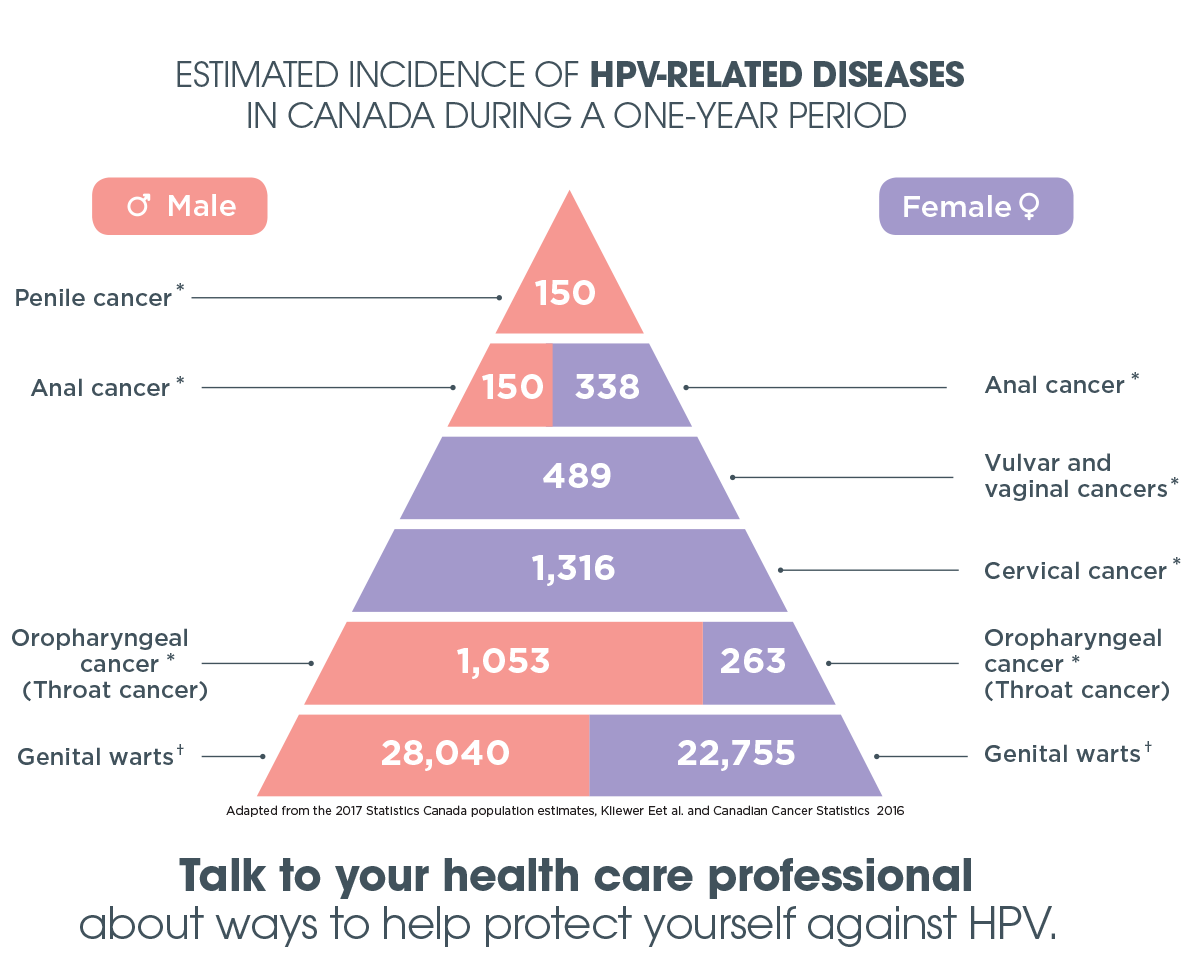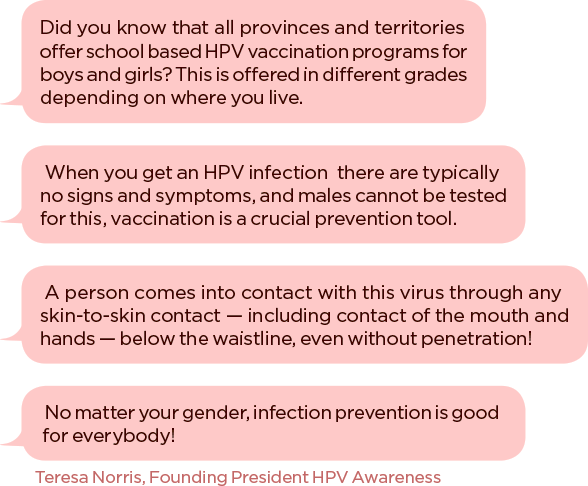
Nancy Durand, MD CM, FRCS
Sunnybrook Health Sciences Centre
Leah Smith, PhD
Senior Manager – Surveillance, Canadian Cancer Society
Human papillomavirus (HPV) is a well-known cause of cervical cancer in women, but what many don’t know is that it can also cause other cancers and skin lesions such as anogenital warts in both men and women. It is one of the most common sexually transmitted infection in Canada and although condoms play an important role in risk reduction, they do not guarantee complete protection. Oh, and most HPV types are vaccine-preventable.
“We now know that HPV causes at least six types of cancer and that about one in three HPV-related cancers diagnosed in Canada are in males,” says Leah Smith, Senior Manager of Surveillance at the Canadian Cancer Society. The six types refer to cervical, anal, vulvar, vaginal, oropharyngeal, and penile cancers. “Fortunately, we now have the tools to help prevent some HPV-related cancers. For some males and females, this means getting vaccinated. Since about 75% of sexually active Canadians are expected to have at least one HPV infection at some point during their lives, it’s important that everyone discuss about how to help prevent it with their healthcare professional.”
An equal-opportunity disease
For too long, HPV was seen as a concern only for people with cervices, but decades of research has shown that the risk for men can be as high or higher. “Yes, the disease can cause cervical cancer, vaginal cancer, and vulvar cancer in women,” says Dr. Nancy Durand of Sunnybrook Health Sciences Centre in Toronto. “But, in both men and women, it can cause anal and oral cancer. One of the most common outcomes, which also affects both men and women, is external genital warts.”
It’s particularly poignant to note that the cancers HPV can cause in men are becoming more common, even as cervical cancer rates are falling. “HPV-related anal cancer is rising around the world and it does not require anal intercourse for transmission,” notes Dr. Durand. “Our understanding of HPV has really shifted from it being a female-focused disease to it being a universal disease.”
Unvaccinated and unaware: Know your risks and what you can do about them
This is the first year that in-school HPV vaccination has been universally available to school-aged adolescent girls and boys across the country, but for the millions of Canadians who finished school before the programs were fully rolled out, it is not too late to take the step of getting immunized. Men in the 18 to 26 age range particularly are largely unvaccinated, unaware of their risk, and may not know that the vaccine is often covered, at least in part, by their college, university, or parents’ insurance plans.
Our understanding of HPV has really shifted […] to it being a universal disease.
Dr. Nancy Durand
Given that the first and last formal sexual health education most Canadians get is in high school health class, we owe it to ourselves to do our research, keep up with ongoing developments, and replace old myths and misconceptions with the cold, hard facts. It’s easy to assume, for example, that the pervasiveness of the disease means there is little point in getting vaccinated if you are already sexually active — but that’s simply not true.
An opportunity for prevention
“HPV vaccines protect against the most common HPV types that cause serious problems,” says Smith. “So even if you’ve already been exposed to one or more HPV types, the vaccines can still help provide you with protection against other types of HPV. Anyone who hasn’t been vaccinated and would like to learn more about whether HPV vaccination is right for them should speak with their health care provider.”
At the end of the day, we have access to vaccines, some with a decades-long track record of efficacy. “We need to stop thinking about it simply as a vaccine that protects against an STI,” emphasis Dr. Durand, “and start thinking of it the same way we would if a vaccine could prevent breast cancer or prostate cancer.”
HPV infections are preventable and can affect anyone that is sexually active. Let’s help prevent it. You can get more information about HPV, HPV vaccination, genital warts, and HPV-related cancers at HPV Awareness.

HPV = Human Papillomavirus
* Based on Canadian incidence counts in 2012
† Based on an incidence in Manitoba in 2004 and generalized to Canada of 1.54/1,000 males and 1.23/1,000 females and 2017 Canadian census data.
This article was made possible with the support of a leading pharmaceutical company.



